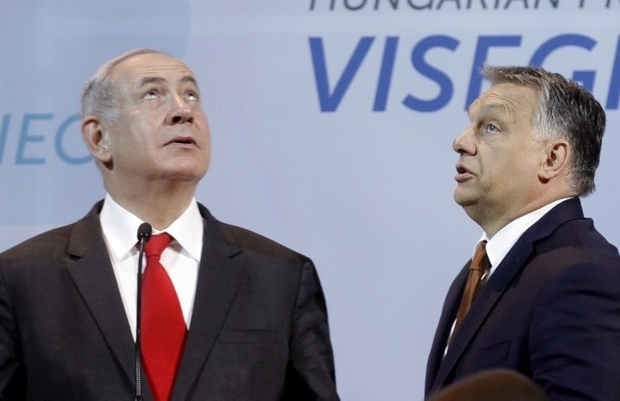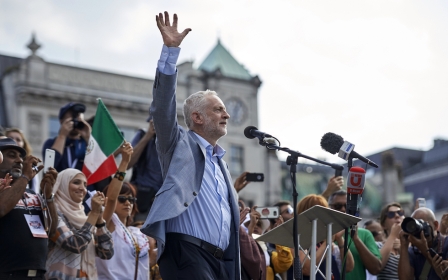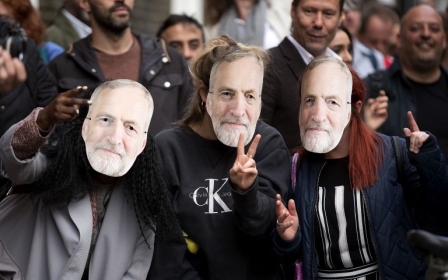Labour and anti-semitism in 2018: The truth behind the relentless smear campaign against Corbyn

End-of-year polls are always popular as a way to gauge significant social and political trends over the past year and predict where things are heading in the next. But a recent poll of European Jews – the largest such survey in the world – is being used to paint a deeply misleading picture of British society and an apparent problem of a new, left-wing form of anti-semitism.
An anti-semitism problem?
The survey was conducted by the European Union's agency on fundamental rights and was given great prominence in the liberal-left British daily the Guardian. The newspaper highlighted one area of life in which Britain scored worse with Jews than any of the other 12 member states surveyed.
Some 84 per cent of Jews in the UK believe there is a major problem with anti-semitism in British politics. As a result, nearly a third say they have considered emigrating – presumably most of them to Israel, where the Law of Return offers an open-door policy to all Jews in the world.
The Guardian has been at the forefront of framing Corbyn as either indifferent to, or actively assisting in, the supposed rise of anti-semitism in Labour
Britain scored only slightly better on indices other than politics. Some 75 per cent said they thought anti-semitism was generally a problem in the UK, up from 48 per cent in 2012. The average score in the 12 EU states with significant Jewish populations was 70 per cent.
Jeremy Corbyn, head of the UK’s opposition Labour party, has faced a barrage of criticism since he was elected leader more than three years ago for presiding over a supposedly endemic anti-semitism problem in his party. The Guardian has been at the forefront of framing Corbyn as either indifferent to, or actively assisting in, the supposed rise of anti-semitism in Labour.
Now the paper has a senior European politician echoing its claims.
'Playing with fire'
Relating to the poll, Vera Jourova, the EU’s commissioner for justice, helpfully clarified what Britain’s terrible results in the political sphere signified. The paper quoted her on Corbyn: "I always use the phrase 'Let’s not play with fire', let’s be aware of what happened in the past. And let’s not make the same mistake of tolerating it. It is not enough just to be silent … I hope he [Corbyn] will pay attention to this survey.”
However, both Jourova’s warnings and an apparent perception among British Jews of an anti-semitism problem fuelled by Corbyn fly in the face of real-world evidence.
The evidence suggests very persuasively that Corbyn has been a force for eradicating, or at least diluting, existing and rather marginal anti-semitic views in the Labour party
Other surveys show that, when measured by objective criteria, the Labour party scores relatively well: The percentage of members holding anti-Semitic views is substantially lower than in the ruling Conservative party and much the same as in Britain’s third party, the Liberal Democrats.
For example, twice as many Conservatives as Labour party members believe typically anti-Semitic stereotypes. Even more significantly, the percentage of Labour party members who hold such prejudices has fallen dramatically across the board since Corbyn became leader.
This fact suggests that the new members who joined after Corbyn became leader – a massive influx has made his party the largest in Europe – are less likely to be anti-Semitic than those who joined under previous Labour leaders.
But all of this, yet again, went unremarked by the Guardian and other British media, which have been loudly claiming a specific “anti-semitism problem” in Labour for three years without a shred of concrete evidence for it.
Resurgent white nationalism
There are good grounds for Jews to feel threatened in much of Europe at the moment, with the return of ugly ethnic nationalisms that many assumed had been purged after World War Two. And Brexit – Britain’s planned exit from the European Union – does indeed appear to have unleashed or renewed nativist sentiment among a section of the UK population.
But such prejudices dominate on the right, not the left. Certainly Corbyn, a lifelong and very prominent anti-racism activist, has not been stoking nativist attitudes.
The unexplored assumption by the Guardian and the rest of the corporate media, as well as by Jourova, is that the rise in British Jews’ concerns about anti-semitism in politics refers exclusively to Corbyn rather than a very different problem: Of a resurgent white nationalism on the right.
Hungary is a country in which Jews and other minorities undoubtedly face a very pressing threat to their safety
But let’s assume that they are correct that the poll solely registers Jewish worries about Corbyn. A separate finding in the EU survey underscored how Jewish opinion on anti-semitism and Corbyn may be far less straightforward than Jourova’s presentation suggests – and how precisely the wrong conclusions are likely to be drawn from the results.
Buried in the Guardian report was a starkly anomalous finding – from Hungary.
The Hungary anomaly
Hungary is a country in which Jews and other minorities undoubtedly face a very pressing threat to their safety. Its ultra-nationalist Prime Minister, Viktor Orban, used the general election last April to whip up a frenzy of anti-Jewish sentiment.
He placed the Hungarian-born Jewish billionaire George Soros at the centre of his anti-immigration campaign, suggesting that the philanthropist was secretly pulling the strings of the opposition party to flood the country with “foreigners”. In the run-up to the election, his government erected giant posters and billboards all over the country showing a chuckling George Soros next to the words: “Don’t let Soros have the last laugh.”
Raiding the larder of virtually every historic anti-Semitic trope, Orban declared in an election speech: “We are fighting an enemy that is different from us. Not open, but hiding; not straightforward but crafty; not honest but base; not national but international; does not believe in working but speculates with money; does not have its own homeland but feels it owns the world.”
Not only that, but the proportion of Hungarian Jews fearful of anti-semitism has actually dropped over the past six years. Some 77 per cent see anti-semitism as a problem today, compared to 89 per cent in 2012, when the poll was last conducted.
Israeli politicians loathe Corbyn because he has made support for the Palestinian people a key part of his platform
So, the survey’s results are more than a little confounding. On the one hand, at least according to the British media and the EU, British Jews are in a heightened state of fear about the UK Labour party, where the evidence suggests an already marginal problem of anti-semitism is actually in decline.
And on the other, Hungarian Jews’ fears of anti-semitism are waning, even though the evidence suggests anti-semitism is on the rise and government-sanctioned there.
Understanding the paradox
There is, however, a way to explain this paradox – and it has nothing to do with anti-semitism.
Corbyn’s socialist-lite agenda faces a devastating array of opponents that include British business; the entire spectrum of the UK corporate media, including its supposedly liberal components; and, significantly in this case, the ultra-nationalist government of Israel, headed by Benjamin Netanyahu.
The British establishment fears Corbyn poses a challenge to the further entrenchment of neoliberal orthodoxy they benefit from. Meanwhile, Israeli politicians loathe Corbyn because he has made support for the Palestinian people a key part of his platform, becoming the first European leader to prioritise a Palestinian right to justice over Israel’s right to maintain its 51-year belligerent occupation.
Netanyahu, like Orban, intensely dislikes Soros’s liberalism and his support for open borders. Netanyahu shares Orban’s fears that a flood of refugees will disrupt his efforts to make his state as ethnically pure as possible.
Earlier this year, for example, Netanyahu claimed that Soros had funded human rights organisations to help African asylum seekers in Israel avoid a government programme to expel them. Netanyahu has many practical and ideological reasons to support not only Orban but the new breed of ultra-nationalist leaders emerging in states like Poland, Italy, France and elsewhere.
Hostility to Muslims
Nativism in European states is primarily directed against Muslim and Arab immigrants arriving from the Middle East and North Africa, though domestic Jews could well become collateral damage in any future purge of “foreigners”.
Europe’s ultra-nationalist leaders are, therefore, more likely to sympathise with Israel and its own “Arab-Muslim problem”, especially since Netanyahu and the Israeli right have proved adept at falsely presenting the Palestinians as immigrants rather than the region’s native population.
Netanyahu would also like to see Europe paralysed by political differences, so it is incapable of lobbying for a two-state solution, as it has been doing ineffectively for many years; it is unable to agree on funding human rights activism designed to protect Palestinian rights; and it is too weak to move towards the adoption of sanctions against Israel.
Netanyahu and the Israeli right can identify with the anti-semitic view of “the Jew” shared by Europe’s hardline nationalists
But most importantly, Netanyahu and the Israeli right can identify with the anti-Semitic view of “the Jew” shared by Europe’s hardline nationalists.These far-right groups see Jews as outsiders, a discrete community that cannot be assimilated or exist peacefully among them, and one that has separate loyalties and should either be encouraged to leave or be sent elsewhere.
Netanyahu agrees. He also believes Jews are different, that they are a distinct and separate people, that their primary loyalties are tribal, to their own kind, and not to other states, and that they can only ever really be at home and properly Jewish in Israel, their true home.
Zsofia Kata Vincze, a professor of ethnology in Budapest, recently referred to the ideological affinity between Netanyahu’s Zionism and Orban’s Hungarian-Christian nativism: “They found a common language very easily. They kept talking about mutual values, which are nationalism, exclusivism … Hungarian purity, Jewish purity … against the Others.”
Only ‘partial’ Jews
In fact, Netanyahu’s views are widely shared in Israel. A few years ago the celebrated liberal Israeli author A B Yehoshua outraged American Jews by saying they could only ever be what he called “partial Jews” outside Israel. Speaking of the divide between them and Israeli Jews, he said: “In no way are we the same thing - we are total and they are partial.” He called the refusal of all Jews to live in Israel and become “complete Jews … a very deep failure of the Jewish people”.
A separate poll this month found that, apart from Greeks, Israelis hold the most anti-immigrant views of 27 countries surveyed – more so even than Hungarians.
It is this ideological affinity – between a European ultra-nationalism and the kind of Zionist ultra-nationalism dominant in Israel – that explains why the far-right in Europe venerates Israel while despising Jew
By immigrants, of course, Israelis mean non-Jews. They do not regard the millions of Jews who have arrived in Israel from Europe and the Americas over the past decades as immigrants. Instead they are viewed as olim, or those who “ascend” to Israel, supposedly returning to their Biblically ordained home.
It's this ideological affinity – between a European ultra-nationalism and the kind of Zionist ultra-nationalism dominant in Israel – that explains why the far-right in Europe venerates Israel while despising Jews, and why so many Israelis prefer an Orban to a Soros.
And it is also, of course, explains why Netanyahu and most Israelis detest Corbyn.
Israel's role
Not only does Corbyn offer an inclusive domestic political agenda, unlike the Orbans of Europe but, worse, he also refuses to shy away from confronting the legacy of European racism and colonialism.
Corbyn represents a huge break with that tradition and is, therefore, a threat to Israel. That is why behind the scenes Israel has been seeking to redefine anti-semitism in a way that tars anti-racists like Corbyn and his supporters in the Labour party.
I have documented before in Middle East Eye Israel’s role in stoking the supposed “anti-semitism crisis” in Labour and in cornering the party into adopting a new, convoluted definition of anti-semitism that for the first time makes criticism of Israel the benchmark of anti-Semitic discourse.
Last month Netanyahu made that conflation explicit in a video message to a conference in Vienna. While praising Orban, he averred: “Anti-semitism and anti-Zionism, anti-Israeli polices – the idea that the Jewish people don't have the right for a state – that's the ultimate anti-semitism of today."
But it is not just Netanyahu who is stoking the patently preposterous notion that anti-racists like Corbyn – those whose principles require that they reject Israeli privilege over Palestinians – are really secret Jew-haters. If that were the case, the criticisms of Corbyn might not have as much traction with British Jews as this month’s EU poll suggests.
Media distortions
The UK media have played a vital role in promoting a false image of Corbyn, as a survey by the Media Reform Coalition found in September when it analysed British coverage of the Labour party. The coalition, which is led by academics, concluded that there had been systematic “disinformation” from media outlets. Inaccurate and misleading reporting by the supposedly liberal Guardian was especially pronounced.
Behind the scenes Israel has been seeking to redefine anti-semitism in a way that tars anti-racists like Corbyn and his supporters in the Labour party
“Two thirds of the news segments on television contained at least one reporting error or substantive distortion,” its researchers also discovered. These failures included “marked skews in sourcing, omission of essential context or right of reply, misquotation, and false assertions made either by journalists themselves or sources whose contentious claims were neither challenged nor countered.”
The group is reluctant to infer that these consistent media failures indicate an intention to smear Corbyn.
The real remedy
There is a serious, if rarely explored, ideological tension between Israeli-style Zionism and a progressive or liberal outlook, just as there is between Orbanism and liberalism.
In a political climate where European nativists are on the rise, the stark choice facing Europe’s Jews is to double-down on their traditional left-liberal worldview or abandon it entirely and throw their hat in with Israel’s own nativists. Corbyn represents the first choice, Netanyahu’s hardline Zionism the second.
Bombarded by disinformation campaigns, it looks like many British Jews are being misled into seeing Corbyn as a threat – of a confected “left-wing anti-semitism” – rather than as the best hope of inoculating Britain against the resurgence of a very real menace of right-wing anti-semitism.
Jewish emigration to Israel will make matters far worse. It will pander to the prejudices of Europe’s white nationalists, weaken the European left, and bolster an equally ugly Jewish nationalism that requires the oppression of Palestinians.
- Jonathan Cook, a British journalist based in Nazareth since 2001, is the author of three books on the Israeli-Palestinian conflict. He is a past winner of the Martha Gellhorn Special Prize for Journalism. His website and blog can be found at: www.jonathan-cook.net.
The views expressed in this article belong to the author and do not necessarily reflect the editorial policy of Middle East Eye.
Photo: Labour Party leader Jeremy Corbyn (AFP)
New MEE newsletter: Jerusalem Dispatch
Sign up to get the latest insights and analysis on Israel-Palestine, alongside Turkey Unpacked and other MEE newsletters
Middle East Eye delivers independent and unrivalled coverage and analysis of the Middle East, North Africa and beyond. To learn more about republishing this content and the associated fees, please fill out this form. More about MEE can be found here.











